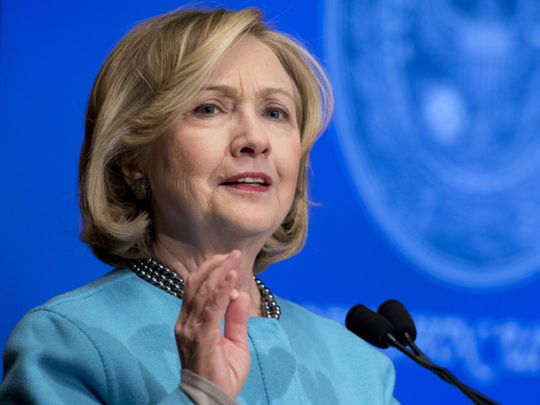
I have been avoiding the temptation to write a column about the 2016 US presidential contest because, well, it is still 2014. America, however, is the land of the permanent campaign, so with last month’s mid-term elections safely in the past and a new, more assertive, Barack Obama seemingly ready to take bolder positions during his final two years in office, the time seems right for an early look at the field. Today, I will focus on the Democrats. My next column will look at the Republicans.
Let us begin by stating the obvious: Hillary Clinton is running. The hundreds of articles and TV discussions over the last two years speculating about whether the former secretary of state plans a second campaign for the White House have been some of the dumbest political analysis ever produced by America’s pundit class. It is not just that she acts like someone planning to run (publishing a vapid, politically-safe memoir; turning up at political events in Iowa; dropping carefully-scripted ‘hints’ during media interviews). At a more basic level there is simply this: She clearly wants to be president and is surrounded at all times by people telling her that she can and should be president. No one in that situation chooses not to run.
The only real question among Democrats is who will attempt to challenge Hillary? Potential candidates fall into two broad categories. First: People on the left of the party, such as Senators Bernie Sanders of Vermont and Elizabeth Warren of Massachusetts, who know they have little chance of winning the Democratic nomination but who value the opportunity to raise issues important to the party’s liberal base. The second group consists of rising stars in the party, such as New York Governor Andrew Coumo, former Maryland governor Martin O’Malley and former senator Jim Webb of Virginia, who want to raise their national profiles in anticipation of the 2020 and 2024 presidential campaigns. Most political observers believe that Vice-President Joe Biden does not intend to challenge Hillary (though if she does not run — hey, I could be wrong! — he would almost certainly jump into the race).
You may be thinking that we have been here before. Eight years ago, in late 2006, it was an equally ironclad bit of conventional wisdom that Hillary had no serious challenger for the Democratic Party’s 2008 presidential nomination. That, of course, turned out not to be the case.
Two things make this year different. First, there is no Obama-like figure waiting in the wings of the Democratic Party. Warren’s supporters like to portray her in this way, but unlike the Barack Obama of 2005-06 there is neither evidence that she is quietly building a national campaign organisation behind the scenes nor any indication that she is trying to tap the donor class whose money is sadly essential for any serious American presidential candidate. Second, there is Hillary herself. For many in the party there is a sense that her near-miss in 2008 followed by four years of loyal service as Obama’s secretary of state have earned Hillary the chance to represent the party in a national election — that includes many Democrats who backed Obama instead of her eight years ago.
The fact that the party, in doing so, would be offering Americans their first female president immediately after the first black president retires also appeals to many Democrats. Their party is increasingly a coalition of minority groups large and small, which makes the idea of breaking barriers especially compelling for many of its members.
But even if no Obama-like figure looms to block Hillary’s path this time around, that does not mean either that her nomination is a given or that a general election victory will follow. Politics, by its very nature, contains too many variables and too much uncertainty for that to ever be the case this far out.
More than anything else, what beat Hillary in 2008 was a sense that Obama offered something young and fresh — a break with the past — particularly when compared to a Hillary campaign which, whether it meant to or not, often reeked of entitlement.
Over the last few months, it has become common to point to her recent book tour, call it “disastrous” and ask whether the former first lady, senator and secretary of state is getting ready to repeat the mistakes (a bloated staff prone to infighting, failure to take her opponents seriously) that helped make Obama’s victory possible six years ago.
I would not bank on it. Anything, of course, is possible, but Hillary is not someone a wise opponent would underestimate (Obama certainly did not). She has been a global figure for 25 years and has been tested and scrutinised in ways the rest of us can barely imagine. Though the media often calls her book tour a “failure”, one thing it did not fail to do was turn out huge crowds willing to wait for hours just for a glimpse of Hillary. She excites people in a way no other Democrat does — and in ways she herself did not the last time around.
None of that makes her America’s next president, but among Democrats, at least, it still makes her the prohibitive favourite.
Gordon Robison, a longtime Middle East journalist and US political analyst, teaches political science at the University of Vermont.








